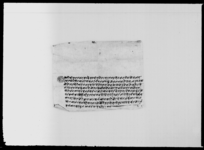A purjī from Subedāra Saraṇabhadra Silavāla to Subbā Ṅavāṅ Khunu re pressing matters relating to Bhoṭa [ca. VS 1934]
ID: E_3446_0028
Edited and
translated by Rajendra Shakya
in collaboration with
Rabi Acharya
Created: 2019-04-10;
Last modified: 2020-11-03
For the metadata of the document, click here
The accompanying edition, translation/synopsis and/or commentary are available under the terms of the Creative Commons Attribution-ShareAlike 4.0 International License
Abstract
This purjī from Subedāra Śaraṇabhadra Silavāla orders Subbā Ṅavāṅ Khunu to go at once to Tibet, while he himself heads to Nepal (i.e. Kathmandu) to deal with a pressing issue relating to Tibet.Diplomatic edition
[1r]
1श्री\[Seal with the legend: श्रीफुलचोकी]1स्वस्तिश्रीसुवाङव़ाङ्षुनुकेइतश्रीसुवेदारसरणभद्रसिलवालक्षेत्रृकोसलाम्2उप्रान्तभोटसितकाकुरामामलाईनेपालजानढिलोहालाभंनालेतिमिलाइपठाय़ा
3कोहोताहाकेरुंकाढेवालाइपनिचिठिपठायाकोछस्वचिठिदिढेवालेंविहोरामि
4लाउछन्भन्याबढियाभयोजोगर्नुपर्न्यावन्दोवस्तगरिचाडोआउनुवन्दोवस्त
5मिलेनभन्याचिठिपत्रलीसर्वथाआउन्याकामगर्नुमसरासरनेपालजान्छुरजो
6गर्नुपर्न्याकुराचिठ्ठीगरीहुकुम्भयावमोजिम्गरिपठाउलातिमिसर्वथाफर्कन्या
7कामगरयोपुर्जीदेषनिमात्रफर्कन्याकामगरेनौरनेपालतर्फजानामाला
8ग्यौभन्याजनम्कामेरोपापलागलाकौनैकुराकोसन्धेहनमानिफर्कनुजोगर्नु
9पर्न्याकाममगरुलाआषाडशुदि५रोज१श्भ्म्¯¯¯ ¯¯¯ ¯¯¯ ¯¯¯ ¯¯¯ ¯¯¯ ¯¯¯ ¯¯¯
Translation
[1r]
[Seal with the legend: śrī phulacokī]
Hail! To Śrī SubbāṄavāṅ Khunu
[Please accept] salutations from Śrī SubedāraŚaraṇabhadra Silavāla Kṣetrī (text: Saraṇabhadra Silavāla Kṣetṛ)
Uprānta: Regarding matters relating to Bhoṭa, you are being sent [there] because it would likely delay my trip to Nepal (i.e. Kathmandu) [if I were to go myself]. A letter is being sent [through you] to the ḍhevā1 of Kerung there as well. Once you hand over that letter, it would be great if the ḍhevā agrees upon the details [in it]. Make arrangements as required and return promptly. If arrangements can’t be made, by all means carry out the task of returning with a letter [from him].
I shall go to Nepal straightaway and shall send a letter [to you, acting] in accordance with [any eventual] hukuma. You, by all means, carry out the task of returning. If, even after seeing this purjī, you do not carry out the task of returning but cling [to the notion] of going on to Nepal, then my life's sins will cling [to you]. Return without any doubts about anything. I shall do what needs to be done.
Sunday, the 5th of the bright fortnight of Āṣāḍha2 . Auspiciousness.
Commentary
Not much can be learned from this document alone, except for the fact that there were certain pressing matters between Nepal and Tibet that required immediate attention—for Subbā Ṅavāṅ Khunu to go to Kerung, Tibet, and for Subedāra Śaraṇabhadra to go to Kathmandu). It is clear from the document that the situation was so critical that it was important for the latter to report to the seat of government personally as soon as possible; that it would have been imprudent if he himself had gone to Tibet to deal with the issue. Hence he sends his good friend Ṅavāṅ Khunu to Tibet to meet the challenge as best as he can alone. It is known from another document, E_3446_0027, from VS 1934 (1878 CE) that the two are good friends. Further, another document, L_1200_0027, dated VS 1932 (1876 CE), makes it clear that the pressing issue was a dispute regarding the demarcation of a border after the ḍhevā of Jhugā claimed that certain parts of the Gorkha kingdom belonged to Tibet.
It appears that a letter regarding the developing situation had already been sent to the ḍhevā of Kerung, whose name (Khāmsaṃ Vāṅdī) is not mentioned here but does occur in E_3446_0027. The same three persons are again referred to L_1200_0027, but there too the name of the ḍhevā of Kerung is not mentioned. Since the names and positions held by the two other persons named in these three documents are the same, there is good reason to believe that the unnamed ḍhevā of Kerung in this document is Khāmsaṃ Vāṅdī, and that the document was issued around the same period, i.e. between 1876 and 1878 CE.
E_3446_0028 and L_1200_0027 contain the same handwriting and bear the same seal, and hence one can say with assurance that the scribe was the same in both cases.

